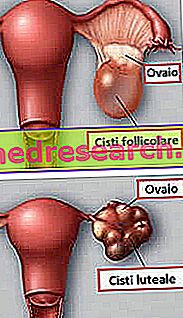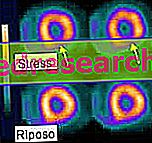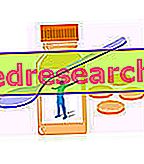Generality
The follicular cyst is the most common functional ovarian cyst.
Filled with liquid and free of tumor characteristics, follicular cysts mainly affect women of reproductive age.

In most cases, they are asymptomatic - that is they do not cause symptoms - and tend to disappear spontaneously within a few weeks. More rarely, they can cause symptoms (including pelvic pain, a sense of pressure, nausea and vomiting) and require medical attention.
The causes of follicular cysts are to be found in an abnormality of the menstrual cycle and, specifically, in an inappropriate process of separation between follicle and egg cell.
In general, to establish the presence of a follicular cyst, the following are fundamental: physical examination, anamnesis and an ultrasound examination of the ovaries.
A brief review of what ovarian cysts are
Ovarian cysts are pockets filled with liquid or solid material, which can form on or inside a woman's ovaries .
In most cases, they are something physiological, which depends on the menstrual cycle ; more rarely, they are the consequence of benign or malignant tumors, or of pathological conditions such as endometriosis or polycystic ovary .
In the medical field, physiological ovarian cysts are called functional cysts, while ovarian cysts due to a pathological condition are called pathological (or non-functional) cysts .
What is a follicular cyst?
A follicular cyst is a functional ovarian cyst.
Therefore, according to what has been said above, it is a cyst that depends on physiological processes and not on particular morbid conditions.
Other examples of functional cysts are the so-called luteal cysts and the so-called thecal cysts .
FEATURES
The follicular cyst is filled with whitish fluid and can be located both inside and outside the ovaries.
It is not a malignant tumor and, generally, it resolves itself in a completely spontaneous way, without consequences.
Epidemiology
The follicular cyst is the most widespread type of ovarian cyst.
Generally, it affects women of reproductive age.
Causes
During the first part of the human oogenesis process, the future egg cell begins its maturation process within a protective structure, called the follicle .
As soon as the egg cell is mature - therefore ready for an eventual fertilization - a hormonal signal is triggered, which determines the rupture of the follicle and the escape of the same egg cell towards the fallopian tubes and the uterus ( ovulation ).

Leaving aside what happens then, in some circumstances the aforementioned mechanism - namely the detachment of the egg cell from the follicle on hormonal stimulation - does not occur correctly and the egg cell remains confined within the follicle. The abnormal permanence of the egg cell inside the follicle causes the latter to fill with liquid, giving rise to a sac.
This bag is nothing but the so-called follicular cyst.
RISK FACTORS
Doctors agree that, for a woman, they are risk factors for follicular cysts:
- Have a past history of ovarian cysts;
- Have an irregular menstrual cycle;
- Having had your first period quite early (11 years or less);
- Use fertility drugs;
- Suffering from hormonal imbalances;
- Have an excess of abdominal and thoracic fat;
- Being particularly stressed or suffering from stress.
Symptoms
In most cases, episodes of follicular cysts are asymptomatic, meaning they do not cause obvious symptoms and signs. More rarely, they can cause:
- Pain in the lower abdomen;
- Sense of pressure in the lower abdomen;
- Nausea and vomit;
- Changes in the length of the menstrual cycle.
WHAT DOES THE PRESENCE OF SYMPTOMS DEPEND ON?
Typically, a follicular cyst is symptomatic when it is large or when it breaks, pouring its contents out.
Important note : a large follicular cyst is responsible for pain and a sense of pressure in the abdomen, because it compresses the blood vessels that supply blood to the ovaries and the fallopian tubes.
WHEN TO REFER TO THE DOCTOR?
A woman who usually suffers from asymptomatic follicular cysts should contact her doctor if she suddenly feels severe pain in the abdomen, accompanied by nausea and / or vomiting.
Immediate medical assistance is important especially if the follicular cyst is ruptured: due to its severity, in fact, this condition is to be considered an emergency to which all necessary attention is immediately given.
Diagnosis
The diagnosis of follicular cysts can be difficult, especially if the condition is asymptomatic.
That said, the canonical diagnostic procedure to which women suspected of suffering from follicular cysts are subjected includes:
- A careful objective examination;
- An accurate medical history;
- Pelvic ultrasound and / or transvaginal ultrasound.
In the presence of painful or otherwise symptomatic follicular cysts, a nuclear magnetic resonance and / or a CT scan can also be added to the above diagnostic tests. These additional diagnostic tests allow doctors to study the characteristics of the follicular cysts present and the causes triggering the symptoms.
Curiosity
Because follicular cysts are asymptomatic, many women are unaware that they are affected and only notice it during some diagnostic test, performed for other reasons.
Therapy
If it is asymptomatic, the follicular cyst represents a not serious clinical condition, which resolves itself spontaneously, without resorting to particular treatments.
If instead it is responsible for a certain symptomatology, it represents - as anticipated - a condition of a certain clinical relevance, which is resolved only with the intervention of the doctor.
Specifically, symptomatic episodes of follicular cysts require surgical treatment.
WHAT DO MEDICAL DOCTORS RECOMMEND IN THE CASE OF ASYMOMATICAL CYSTS?
The main advice doctors give to women with asymptomatic follicular cysts is to undergo periodic gynecological examinations. These controls are a way to observe if the cysts are constant in size or if other anomalies have appeared.
HEALING OF AN ASINTOMATIC FALLING CYST
Asymptomatic episodes of follicular cysts heal spontaneously over 3-6 weeks .
DRUG AGAINST THE FOLLICULAR CYST
Sometimes, for women who habitually suffer from follicular cysts, doctors prescribe an oral contraceptive or other types of contraceptives, which prevent the formation of the follicle by the ovaries.
By blocking the process of creating the follicle, these pharmacological remedies ensure that the typical conditions for the development of a follicular cyst are also missing.



